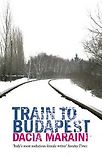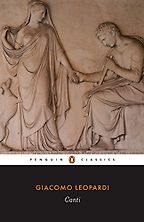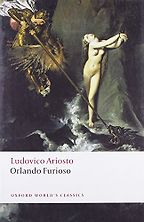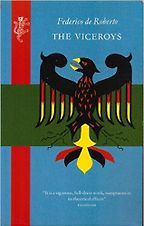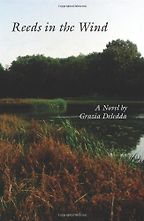Tell me about The Canti of Leopardi first.
I canti is a collection of poems with an idea that coincides with my idea of life. In Italy we have many classics which are Catholic, for example Dante, a wonderful poet. But I prefer Leopardi because he doesn’t have this Catholic idea of guilt and punishment. Leopardi doesn’t believe in another world, paradise or hell and he has a deep relationship with nature. One of the most beautiful poems is ‘Un pastore errante nell’Asia’, ‘A shepherd wandering in Asia’, in which he speaks with the moon and he says: ‘Cosa fai, tu, luna in cielo, che fai?’ ‘What do you do, moon in the sky, what do you do?’, and he goes on talking in a friendly way to the moon. He knows that there is no answer, but he goes on, asking her what she sees from up there, and why she follows the footprints of the shepherd. It is wonderful poem. I know it by heart. Leopardi was born in 1798 and died in 1837. He was from Recanati, a small town in the mid-east of Italy. He died of cholera eating an ice-cream in Naples where he had escaped from a intolerant and oppressive father.
Orlando Furioso, the poem by Ludovico Ariosto.
This is another wonderful poem. It comes from the legend of the French Knights of the Round Table and it’s all about warriors and wanderers who go walking through woods, crossing rivers, climbing mountains. There is a lot of imagination: flying horses and dragons and miraculous springs. The women are courageous and willing to travel to know the world better. That’s what I like in this epic poem. There are many women fighting as men and who go around looking for adventures, for the men they love, riding horses all around the world. It is a beautiful epic poem and the Italian language of Ludovico Ariosto is so inventive and vivid and light. He lived between 1474 and 1533 and he was from the north-centre of Italy, Emilia-Romagna, specifically from a great town called Ferrara. The fourth chapter is about a lot of people who fly, and I love this. In another life maybe I was a bird – I often dream of flying and I love birds. It’s a story of imagination, a sort of fable, but wonderfully written and described.
I Vicerè.
Federico De Roberto was Sicilian and he lived between 1861 and 1927. Another non-Catholic writer: he was against the church as a power. He wrote many books but this is my favourite. The title means ‘the viceroys’, because the Spanish were ruling in Italy and this is the story of a family called Uzeda di Francalancia. It is a sharp and cruel view of the family and they are all horrible people but very realistic. His analysis of this society is in a way cruel but realistic. This is a big strong novel. He is sincerely interested in the destiny of women. But never sentimental and never contemptuous. He understands how society is organised and feels pity for how the women were treated in that society. Even though he portrays also egoistic and violent women characters, some of them were victims and he understood that, which was unusual for a man writing at that time.
Ippolito Nievo, Le Confessioni d’un Italiano.
He was one of the one thousand who followed Garibaldi. He was an intellectual and writer but he wanted to be with Garibaldi unifying Italy in the 1860s. He was born in 1831 and died very young, at 30 years old. He drowned because his ship was attacked by the Austrian army, travelling to Sicily. He was Venetian. These Confessioni are his memoirs and he writes about when he was a child. You can see how people lived in the north of Italy, very poor in these small societies. He wanted the readers to know how poor and ignorant the peasants were at his time, and he attributes this condition to the Austrians who ruled the north of Italy and were against every change in the country. That’s why he fought with Garibaldi, for the unification of Italy. He wrote a portrait of a girl called La Pisana, a famous figure in Italian literature, because it is such a beautiful portrait of this little girl, and the poor people, the peasants..
Canne al Vento.
This is by Grazia Deledda, a writer from Sardinia, born in 1871 and died in 1936. She was from a small bourgeois family and was not permitted to study but she wanted to learn so much that she hid in bed at night to read. She started to write early and she sent short stories to several newspapers who published her and she became very famous and won the Nobel prize in 1926. She always wrote about Sardinia and was very linked to her territory. Canne al Vento is about four sisters in the country who stay with their father and don’t marry, but one goes away, is sent away by the father because she is pregnant and is not married. And after 20 years a letter arrives from her son: the woman has died but he says he wants to come to the house of the family and he wants to know them. So this handsome young man comes to the house of these three women who are so excited to see him, the new nephew. They love him, and do their best to welcome him in the big dark house. But, after some time, they realise that he came to see them because he needs money and he takes all their property away.
Oh no!
Yes, and it is beautifully written.
Tell me about your latest book.
My new book is called Train To Budapest and it’s set in 1956 in the Cold War. A young journalist from Florence is sent to write about how people live on the other side of the Iron Curtain. She takes the opportunity of this work trip to go and look and search for a childhood friend, a little boy, the son of a Jewish family who went back to Austria in 1939 and he wrote many letters to her but disappeared in 1942. She doesn’t know if he died in a concentration camp or if he survived. So she tries to find traces of this young man who would now be 28, and she goes around to visit the camps and looks for him and then, at the end… I won’t say what happens. It is a surprise.
No! Don’t!
June 24, 2010. Updated: September 13, 2021
Five Books aims to keep its book recommendations and interviews up to date. If you are the interviewee and would like to update your choice of books (or even just what you say about them) please email us at [email protected]
Five Books interviews are expensive to produce. If you've enjoyed this interview, please support us by donating a small amount.

